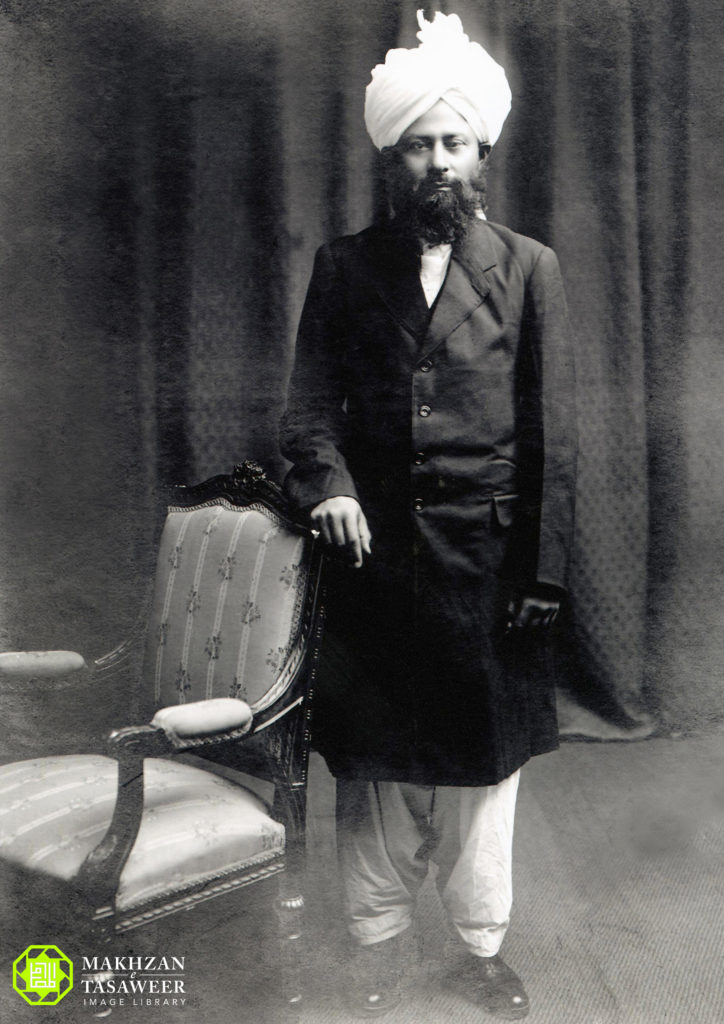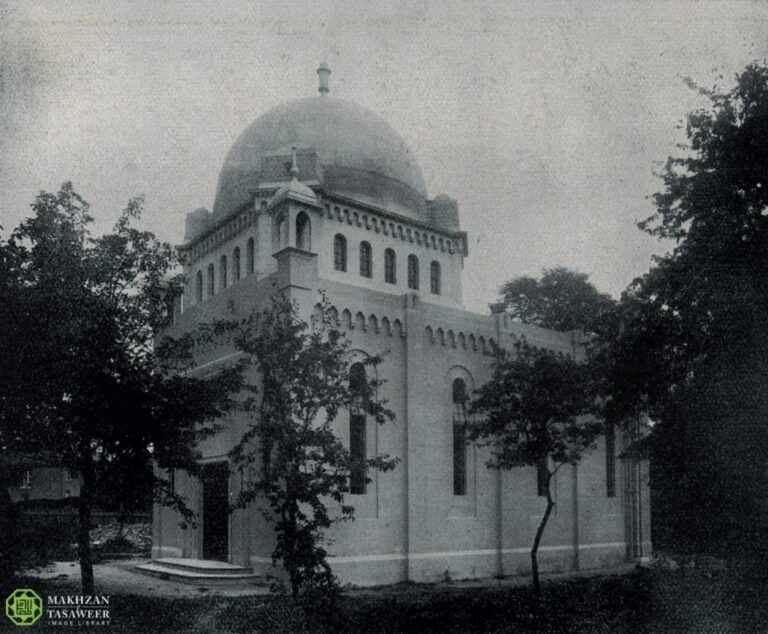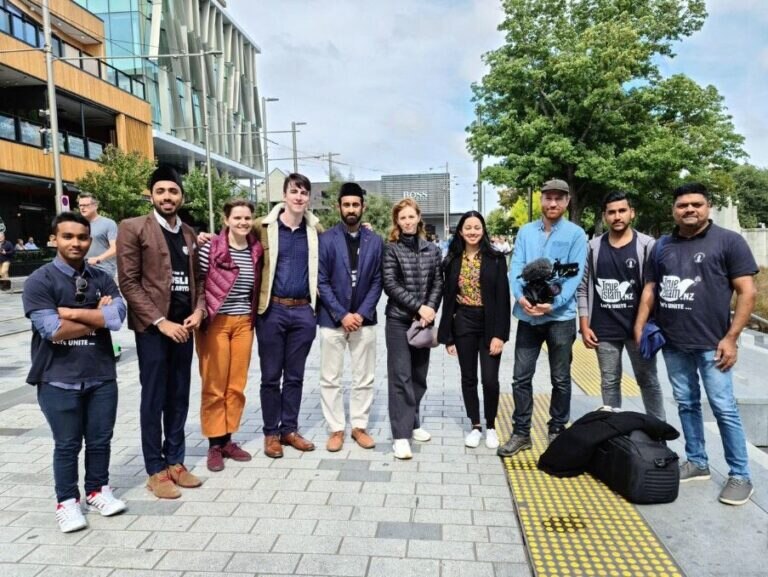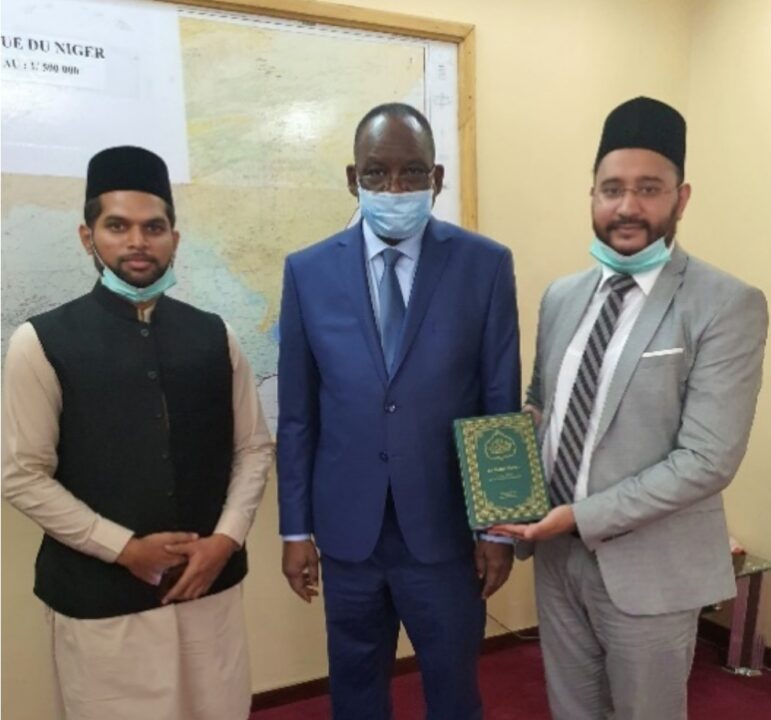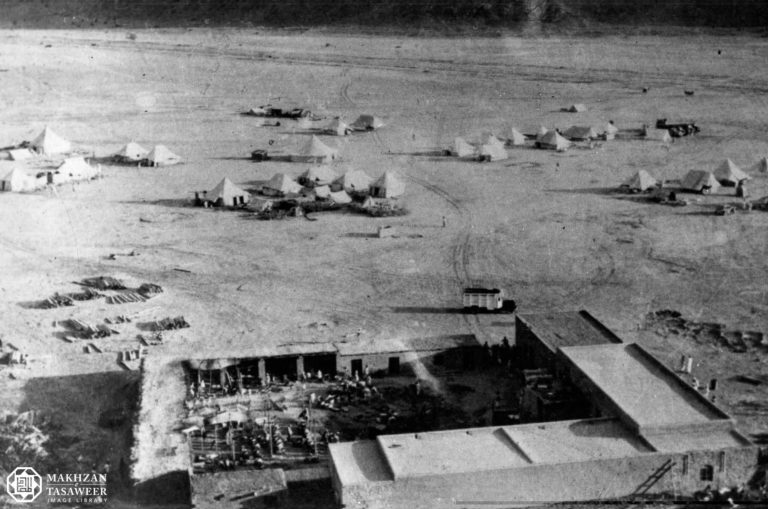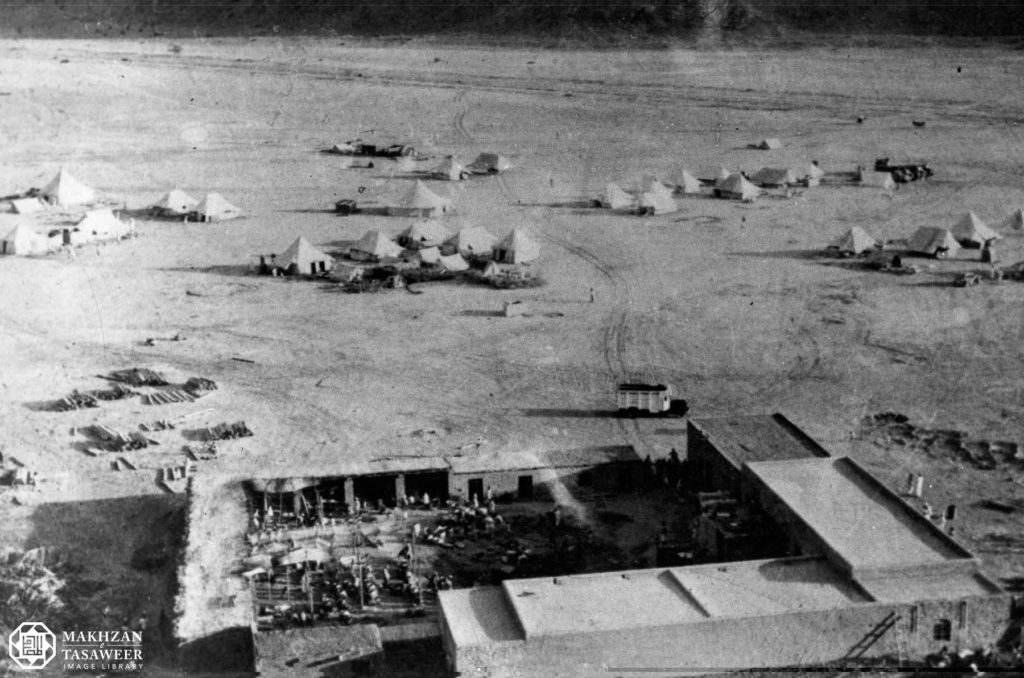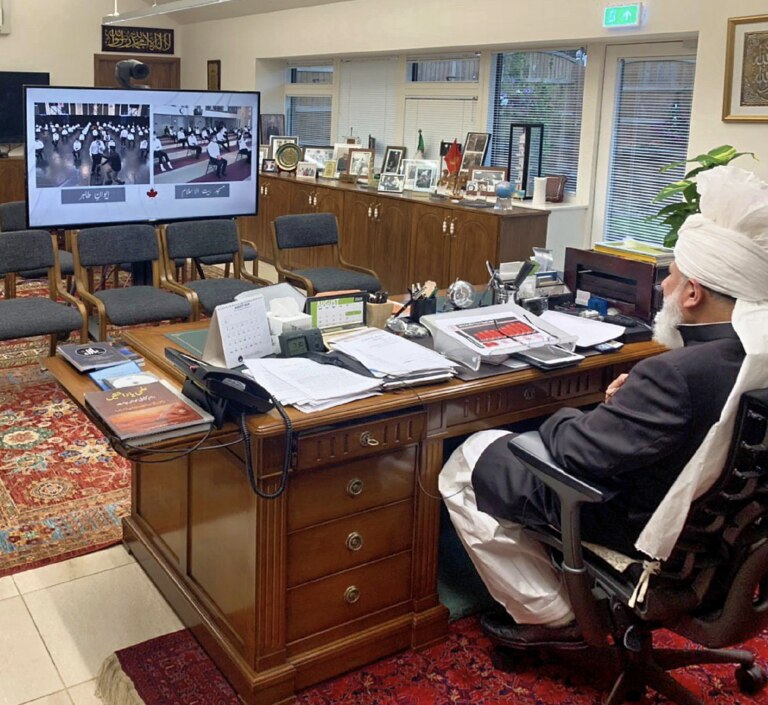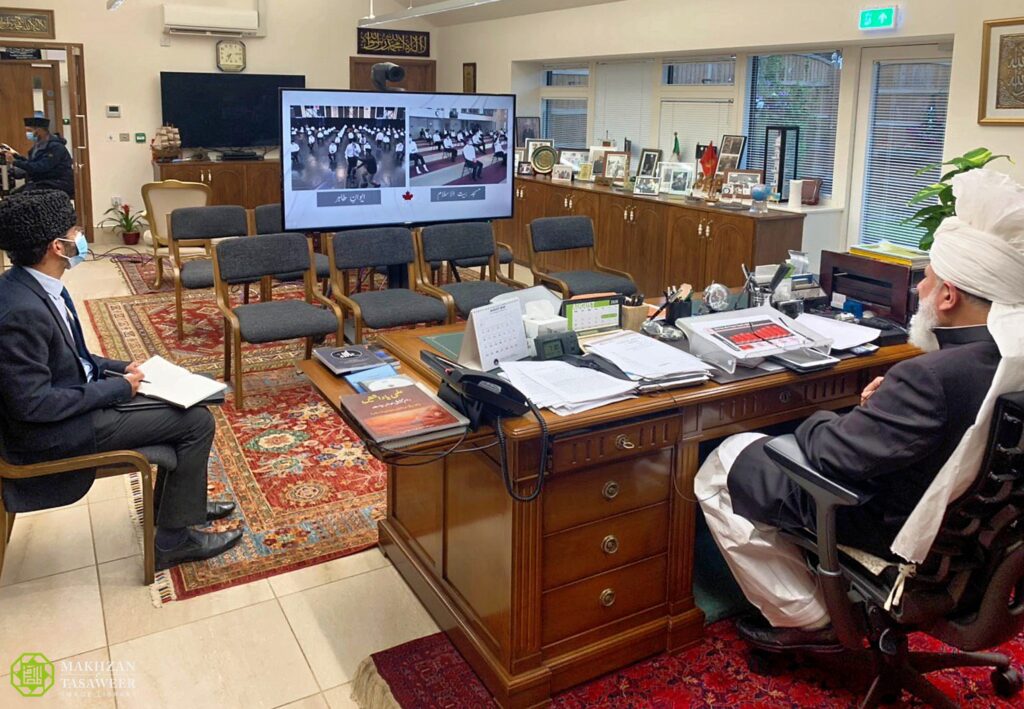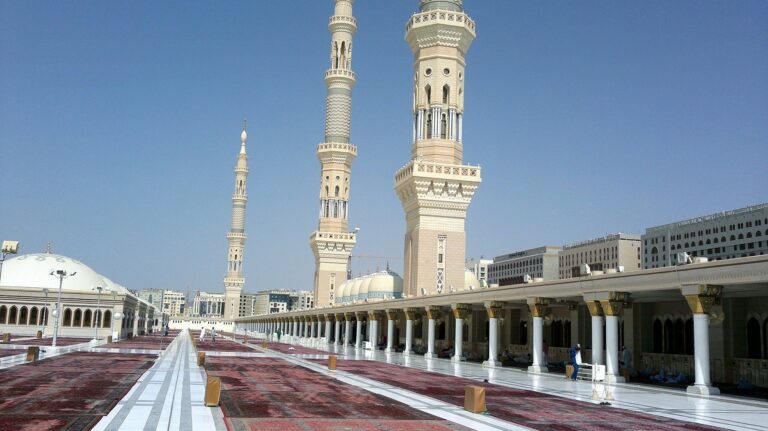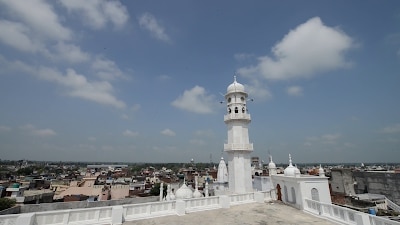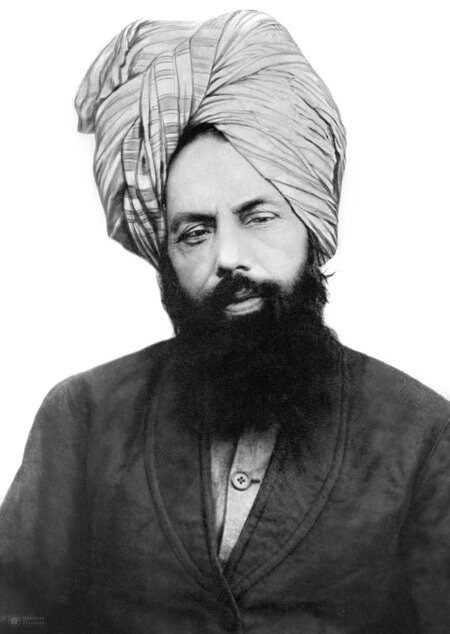Friday Sermon
21 August 2020
Men of Excellence
After reciting the Tashahud, Ta‘awuz, and Surah al-Fatihah, Hazrat Khalifatul Masih Vaa said:
From the lives of the Badri companions, I will narrate the accounts of Hazrat Zubairra bin al-Awam.
Hazrat Zubairra bin al-Awam’s father was Awam bin Khuwailid and his mother’s name was Safiyyahra bint Abdil Muttalib, who was the paternal aunt of the Holy Prophetsa. Hazrat Zubair’sra lineage connects with the Holy Prophetsa through Qusai bin Kilab.
Hazrat Zubairra was the nephew of Hazrat Khadijahra, the wife of the Holy Prophetsa. Hazrat Zubairra was married to Hazrat Asmaara, the daughter of Hazrat Abu Bakrra and the Holy Prophetsa was married to the other daughter of Hazrat Abu Bakrra, Hazrat Aishara. In this way, the Holy Prophetsa and Hazrat Zubairra were married to two sisters. Thus, Hazrat Zubairra had numerous family ties with the Holy Prophetsa.
Hazrat Zubair’sra title was Abu Abdullah. Initially, his mother, Hazrat Safiyyahra gave him the title of Abu Tahir, which was given to him as it was the title of her brother, Zubair bin Abdil Muttalib. However, Hazrat Zubairra bin al-Awam, gave himself the title after his son, Abdullah, which later became more famous.
Hazrat Zubairra accepted Islam after Hazrat Abu Bakrra. He was the fourth or the fifth person to accept Islam. Hazrat Zubairra accepted Islam at the age of 12. According to some narrations, he accepted Islam when he was eight or 16 years of age.
Hazrat Zubairra was among those 10 fortunate companions whom the Holy Prophetsa gave the glad tiding of Paradise in their lifetime. He is also among the Al-Sahab al-Shura – the six men who formed the consultative body and whom Hazrat Umarra nominated to be chosen as the next Khalifa before his demise. (Usdul Ghaba, Vol. 2, p. 307, Zubairra bin al-Awam, Dar-ul-Kutub al-Ilmiyyah, Beirut, 2003) (Al-Isaba Fi Tamyeez Al-Sahaba, Vol. 2, p. 457, Zubairra bin al-Awam, Dar-ul-Kutub al-Ilmiyyah, Beirut, 1995) (Siyar al-Sahaba, Vol. 2, p. 67, Zubairra bin al-Awam, Darul Ishaat, Karachi, 2004)
When Hazrat Zubair’sra father, Awam passed away, Naufal bin Khuwailid used to look after Hazrat Zubairra. When Hazrat Zubairra was a child, Hazrat Safiyyahra – Hazrat Zubairra’s mother – would hit him or scold him. Upon this, Naufal, i.e his uncle, would say to Hazrat Safiyyahra, “Why do you hit and scold your children as if you are angry with them.” Upon this, Hazrat Safiyyahra read the following couplets:
مَنْ قَالَ إِنِّي أُبْغِضُهٗ فَقَدْ كَذَبْ
وَ إِنَّمَا أَضْرِبُهٗ لِكَيْ يَلَبْ
وَ يَهْزِمَ الْجَيْشَ وَ يَأتِيَ بِالسَّلَبْ
وَ لَا يَكُنْ لِمَالِهٖ خَبْاٌ مُخَبْ
يَأْكُلُ فِي الْبَيْتِ مِنْ تَمْرٍ وَّ حَبْ
Meaning, “Whoever says I am angry with him, he is a liar – For I beat him so that he may become courageous and defeat armies and return with the spoils of the dead; I do this lest he takes his wealth and retreats into seclusion, eating dates and bread.”(Al-Isabah Fi Tamyeez al-Sahabah, Vol. 2, p. 458, Zubairra bin al-Awam, Dar-ul-Kutub al-Ilmiyyah, Beirut, 1995)
Nevertheless, this was her mind-set and she brought up her child accordingly, so that he becomes courageous.
It is not necessary for us to commend this and say that this was a good method. Nowadays, we see that generally this decreases the self-esteem of the children. Nonetheless, Allah the Almighty protected him from any ill effects of this beating and strictness. A mother’s maternal affection is a natural phenomenon, undoubtedly she loved him as well and it was not the case that she only beat him. Furthermore, events that occurred later demonstrate that bravery and courage were indeed a part of Hazrat Zubair’sra character.
Allah knows best as to the cause of this. Nevertheless, there was no negative impact due to this treatment in his childhood. If anyone tries this here today, the social services will show up immediately and take the children away. Therefore, mothers should not try and emulate this practice.
When Hazrat Zubairra accepted Islam, his paternal uncle would wrap him in a mat and fill it with smoke so that he would renounce Islam and return to disbelief. However, he used to say that he would never return to disbelief. (Al-Isabah Fi Tamyeez al-Sahabah, Vol. 2, p. 457, Zubairra bin al-Awam, Dar-ul-Kutub al-Ilmiyyah, Beirut, 1995)
Hazrat Musleh-e-Maudra has narrated this incident in relation to Hazrat Zubairra in the following manner:
“Zubairra bin al-Awam, was a very brave youth, who proved to be a great Muslim general during the Islamic conquests. His paternal uncle also tortured him greatly. He would wrap him up in a mat and fill it with smoke from underneath in order to suffocate him. He would then say, ‘Will you now leave Islam or not?’ However, he would tolerate this torture and reply, ‘After having found the truth, I cannot deny it.’” (Dibacha Tafsir-ul-Quran, Anwar-ul-Ulum, Vol. 20, pp. 196-197)
Hisham bin Urwah relates from his father that when Hazrat Zubairra was a child, he had a fight with an individual in Mecca – perhaps this individual treated Hazrat Zubairra harshly. Hazrat Zubairra was young, whereas the other individual was a grown man. Nevertheless, Hazrat Zubairra broke this man’s hand during the fight and injured him severely. Subsequently, this individual was mounted on a horse and brought to Hazrat Safiyyahra in order to show the deeds of her son. Hazrat Safiyyahra asked what had happened to him? The people informed her that Hazrat Zubairra had a fight with him, but did not mention who was at fault. Nevertheless, a fight took place. Upon this, Hazrat Safiyyah recited some verses in relation to the bravery of her son and said:
كَيْفَ رَأَيْتَ زَبْرًا
أَ اَقِطًا حَسِبْتَهٗ اَمْ تَمْرًا
اَمْ مُشْمَعِلًّا صَقْرًا
Meaning, “How did you perceive Zubair? Did you consider him to be similar to cheese or a date that you would be able to devour him easily and do to him as you please? Nay, you must have experienced that he was indeed like a swift attacking eagle.” (Al-Tabaqaat-ul-Kubra li ibn Saad, Vol. 3, pp. 74-75, Zubairra bin al-Awam, Dar-ul-Kutub al-Ilmiyyah, Beirut, 1990)
Hazrat Zubairra participated in both migrations to Abyssinia. When Hazrat Zubairra migrated to Medina, he stayed with Hazrat Mundhirra bin Muhammad. (Al-Tabaqaat-ul-Kubra li ibn Saad, Vol. 3, p. 75, Zubairra bin al-Awam, Dar-ul-Kutub al-Ilmiyyah, Beirut, 1990)
Hazrat Asmaara, the wife of Hazrat Zubairra bin Al-Awam, relates, “When I set off and migrated from Mecca, I was expecting.” She further says, “I stayed in Quba, where Abdullah bin Zubairra was born. I then brought him to the Holy Prophetsa. He placed him in his lap and asked for a date to be brought and chewed it. The Holy Prophetsa first placed his saliva in the mouth of the child (the first thing that entered the stomach of the child was the blessed saliva of the Holy Prophetsa). He then chewed the date and placed it in his mouth and prayed for him to be blessed. This was the first child to be born in Islam [after the migration to Medina].” (Sahih al-Bukhari, Kitan Manaqib Al-Ansar, Hadith no. 3909)
We learn from the narration of Sahih Muslim that the Holy Prophetsa named Hazrat Asmaa’sra son Abdullah. When he was seven or eight years of age, he came to take the oath of allegiance at the hands of the Holy Prophetsa and he was instructed to do so by his father, Hazrat Zubairra. The Holy Prophetsa smiled as he saw him approaching, and thereafter accepted the Bai‘at of Hazrat Abdullahra.(Sahih Muslim, Kitab-ul-Adab, Hadith no. 2146)
When the Holy Prophetsa established the bonds of brotherhood in Mecca between the Muhajireen, he established a bond between Hazrat Zubairra and Hazrat Abdullahra bin Masud. After the migration to Medina, the bond of brotherhood with the Ansar was established between Hazrat Zubairra and Hazrat Salamara bin Sulaamah. (Usdul Ghaba, Vol. 2, p. 307, Zubairra bin al-Awam, Dar-ul-Kutub al-Ilmiyyah, Beirut, 2003)
Hazrat Zubairra named his children after martyrs, so that perhaps they too would be awarded martyrdom by Allah the Almighty. Abdullah was named after Hazrat Abdullah bin Jahshra; Mundhir was named after Hazrat Mundhirra bin Amrra; Urwah was named after Hazrat Urwahra bin Masud; Hamza was named after Hazrat Hamzara bin Abdil Muttalib; Jafar was named after Hazrat Jafar bin Abi Talibra; Musab was named after Hazrat Musabra bin Umair; Ubaidah was named after Hazrat Ubaidahra bin Harith; Khalid was named after Hazrat Khalidra bin Saeed; Amr was named after Hazrat Amrra bin Saeed. Hazrat Amrra bin Saeed was martyred in the Battle of Yarmuk. (Al-Tabaqaat-ul-Kubra li ibn Saad, Vol. 3, p. 74, Zubairra bin al-Awam, Dar-ul-Kutub al-Ilmiyyah, Beirut, 1990)
We do not know how accurate this narration is because if Hazrat Abdullahra was the first child born in Islam [after the migration to Medina], Allah knows best what was his exact year of birth, but there is a doubt whether the martyrdom [of Hazrat Abdullahra bin Jahsh] had taken place by then or not. Nonetheless, the children were named after these noble companions.
Urwahra bin Zubair narrates that Hazrat Zubairra was so tall that whenever he mounted [upon an animal], his feet would touch the ground. (Al-Isabah Fi Tamyeez al-Sahabah, Vol. 2, p. 458, Zubairra bin al-Awam, Dar-ul-Kutub al-Ilmiyyah, Beirut, 1995)
Hazrat Abdullah bin Zubairra relates, “I asked my father (Hazrat Zubairra), ‘Why do I not hear you relate ahadith from the Holy Prophetsa just as Hazrat Abdullahra bin Masud and other companions do so?’ To this he replied, ‘Ever since I accepted Islam, I have never been absent from the company of the Holy Prophetsa but I have heard him say that ‘whoever knowingly attributes falsehood to me, he in turn prepares an abode for himself in hell.”’ (Musnad Ahmad bin Hanbal, vol. 1, p. 451, Zubair bin al-Awam, hadith no. 1413, Alam-ul-Kutb, Beirut, 1998)
He did not imply that the others were attributing lies to the Holy Prophetsa, but only that he deemed it better for himself to remain cautious, lest he utter something incorrect – even though the Holy Prophetsa stated that the punishment would be for those who utter falsehood knowingly. However, he was so careful to avoid even saying something accidentally and consequently becoming among those who incur punishment. This was how cautious he was in this matter.
Hazrat Saeedra bin Musayyib relates that Hazrat Zubairra bin al-Awam was the first to unsheathe his sword in the way of Allah. Once, Hazrat Zubairra was resting in the valley of Mataabikh (the name of a place in Mecca) when all of a sudden, he heard that Muhammadsa had been killed. He left his house immediately whilst wielding his sword. The Holy Prophetsa walked past the place where Hazrat Zubairra was resting and when he saw Hazrat Zubairra, he said to him, “Zubair, stop! What is the matter?”
He said that he heard someone saying that the Holy Prophetsa had been martyred. The Holy Prophetsa asked, “What could you have done even if I had been martyred?” Hazrat Zubairra replied, “I swear by Allah, I had intended to kill every single person dwelling in Mecca” At that moment, the Holy Prophetsa especially prayed for him. It is stated in one narration that the Holy Prophetsa prayed for Hazrat Zubair’sra sword as well. Hazrat Saeedra bin Musayyib says, “I am certain that Allah the Almighty will not let this prayer of the Holy Prophetsa go in vain.” (Kitab Fazail-ul-Sahaba, Imam Ahmad bin Hanbal, Vol. 2, p. 733, Fazail Zubairra bin –al-Awam, Dar-ul-Ilm Al-Taba‘a Wa Al-Nashir Al-Saudia, 1983) (Al-Isti‘ab, Vol. 2, p. 512, Zubairra bin al-Awam, Dar-ul-Jeel, Beirut, 1992) (Mu‘jam-ul-Buldan, Vol. 5, p. 171, Dar-ul-Kutub Al-ilmiyyah, Beirut)
Hazrat Zubairra accompanied the Holy Prophetsa in the Battles of Badr, Uhud and all subsequent battles. During the Battle of Uhud, he remained steadfast by the side of the Holy Prophetsa and pledged allegiance even if it meant death. On the occasion of the Conquest of Mecca, one of the three flags representing the Muhajireen was carried by Hazrat Zubairra. (Al-Tabaqat al-Kubra li ibn Saad, Vol. 3, p. 77, Zubairra bin al-Awam, Dar-ul-Kutub al-‘Ilmiyyah, Beirut, 1990)
On the day of [the Battle of] Badr, the Holy Prophetsa only had two horses with him, Hazrat Zubairra was mounted on one of them. (Al-Tabaqat al-Kubra li ibn Saad, Vol. 3, p. 76, Zubairra bin al-Awam, Dar-ul-Kutub al-Ilmiyyah, Beirut, 1990)
It is related by Hazrat Urwahra that Hazrat Zubairra had three very deep sword-wounds on his body, in which he [Hazrat `Urwah] was able to put his fingers through. Two of these deep wounds were suffered during the Battle of Badr and one was suffered during the Battle of Yarmuk. (Al-Isabah fi Tamyiz al-Sahabah, Vol. 2, p. 459, Zubairra bin al-Awam, Dar al-Kutub al-Ilmiyyah, Beirut, 1995)
Musa bin Muhammad narrates from his father that Hazrat Zubairra bin al-Awam could be recognised by his yellow turban; he was wearing a yellow turban during the Battle of Badr. Upon seeing him, the Holy Prophetsa said that angels had descended in likeness of Hazrat Zubairra – meaning the angels which Allah the Almighty had sent for their help were also dressed in the same attire. (Al-Isabah fi Tamyiz al-Sahabah, Vol. 2, p. 459, Zubairra bin al-Awam, Dar al-Kutub al-Ilmiyyah, Beirut, 1995)
Hisham bin Urwah narrates from his father that Hazrat Zubairra would say that on the day of the Battle of Badr, he encountered Ubaida bin Saeed on the battleground. He was fully clad in armour and only his eyes were visible. He was known by the title of Abu Dhaat al-Karish; he began declaring “I am Abu Dhaat al-Karish.” Upon hearing this, Hazrat Zubairra attacked him with a spear and injured his eye, which resulted in his death. Hisham relates being told that Hazrat Zubairra would say that he had to place his foot on him and pull the spear out with great difficulty, and when he did, he found that both edges and become twisted. Urwah said that the Holy Prophetsa asked Hazrat Zubairra for that spear which he presented to him. When the Holy Prophetsa passed away, it came back into the possession of Hazrat Zubairra. Then Hazrat Abu Bakrra asked for the spear which he gave to him. After Hazrat Abu Bakrra had passed away, Hazrat Umarra asked for the spear and Hazrat Zubairra gave it to him. When Hazrat Umarra passed away, it returned to the possession of Hazrat Zubairra, after which Hazrat Usmanra asked to take the spear from him and Hazrat Zubairra gave it to him. When Hazrat Usmanra was martyred, the spear was given to the family of Hazrat Alira. Eventually, it came into the possession of Hazrat Abdullah bin Zubairra and it remained with him until he was martyred. (Sahih Al-Bukhari, Kitab-ul-Maghazi, Hadith no. 3998)
Hazrat Zubairra bin al-Awam relates that on the day of the Battle of Uhud, the Holy Prophetsa made reference to both of his own parents for him; meaning he said, “May my mother and father be sacrificed for you.” (Musnad Ahmad bin Hanbal, vol. 1, p. 450, Zubair bin al-Awam, hadith no. 1408, Alam-ul-Kutb, Beirut, 1998)
It is narrated by Hazrat Zubairra that on the day of the Battle of Uhud, a lady passed by very swiftly. She was close to seeing the bodies of the martyrs, and the Holy Prophetsa did not like for this woman to see the bodies as they had been severely mutilated. Thus, he ordered for her to be stopped. Hazrat Zubairra relates that he suspected it was his mother, Hazrat Safiyyahra. And so, he went running towards her and met her before she reached the bodies of the martyrs. Upon seeing him, she placed her hands on his chest and pushed him back – she was very strong. She said, “Move aside, I will not speak to you” – meaning she did not want to talk to him nor was she going to listen to anything he said. Hazrat Zubairra informed her the Holy Prophetsa had firmly instructed that she should not see the bodies of the martyrs. Upon hearing this and learning that it was a command from the Holy Prophetsa, she immediately stopped. She took out two pieces of cloth which she had brought with her and said, “These are two sheets I have brought for my brother Hamza, as I received news of his martyrdom. Bury him in these sheets.”
In one narration, Hazrat Safiyyahra stated, “I am aware that my brother’s body has been mutilated, and this has been endured in the way of Allah. Why should we be displeased with what Hazrat Hamzara has endured in the way of Allah? God-Willing, I will remain patient and seek its reward from Allah.” Upon hearing this response from his mother, Hazrat Zubairra went to the Holy Prophetsa and narrated the entire incident to him. The Holy Prophetsa instructed that Hazrat Safiyyahra should be allowed to go to see her brother’s body. Hazrat Safiyyahra proceeded to her brother’s body and upon seeing it, prayed, “Verily to Allah we belong and to Him shall we return” and also prayed for his forgiveness. Then the Holy Prophetsa ordered for him to be buried.
The narrator further states that when Hazrat Hamzara was about to be wrapped in two sheets, they saw an Ansari companion beside him who had also been martyred. His body had also been mutilated as had been carried out with Hazrat Hamzara. [The narrator says] “We felt ashamed that Hazrat Hamza was being buried in two sheets while there was not even a single sheet for the Ansari companion. Thus, we decided to bury Hazrat Hamzara in one of the sheets and bury the Ansari companion in the other. We found that one of them was taller than the other; thus, we drew lots and whichever sheet was drawn for either of the two, they were buried in it. Even then it was not enough and the rest of the body had to be covered with grass.” (Musnad Ahmad bin Hanbal, vol. 1, p. 452, Zubair bin al-Awam, hadith no. 1418, Alam-ul-Kutb, Beirut, 1998) (Al-Sirat al-Nabawiyyah li Ibn Hisham, Vol. 2, p. 97, Safiyyah Wa Huznuha, Maktabah Wa Al-Matba’ah Mustapha Al-Baabi, Egypt, 1995) (Al-Tabaqat al-Kubra li ibn Saad, Vol. 3, p. 10, Dar-ul-Kutub al-Ilmiyyah, Beirut, 1990)
Hazrat Jabir bin Abdullahra narrates that during the Battle of the Ditch, the Holy Prophetsa asked if there was anyone who would bring him news of the Banu Quraizah. Hazrat Zubairra presented his services for the task. The Holy Prophetsa again asked if there was anyone who could bring him information regarding the Banu Quraizah. Again, Hazrat Zubairra presented himself. The Holy Prophetsa asked for a third time, if there was anyone who could bring him information regarding the Banu Quraizah. Hazrat Zubairra said that he was ready for the task. The Holy Prophetsa said, “Every prophet has a disciple and Zubair is my disciple.” Hazrat Abdullah bin Umarra once heard someone saying that he was the son of a disciple of the Holy Prophetsa. Hazrat Abdullah bin Umarra said that this would only be true if he was from the progeny of Hazrat Zubairra. When asked if there was anyone other than Hazrat Zubairra who was given the title of being a disciple of the Holy Prophetsa? Hazrat Ibn Umarra said that to his knowledge there was no one else. (Al-Tabaqat al-Kubra li ibn Saad, Vol. 3, p. 78, Zubairra bin al-Awam, Dar-ul-Kutub al-Ilmiyyah, Beirut, 1990)
Hazrat Abdullah bin Zubairra narrates that on the day of the Battle of the Ditch, he and Umar bin Abi Salama was appointed to guard the women. When he looked up, he saw Hazrat Zubairra riding a horse; he saw him going towards the Banu Quraizah two or three times. When Hazrat Abdullah bin Zubairra returned, he said, “O my father, I saw you going here and there.” He replied, “My son, did you really see me?” When he said, “Yes”, Hazrat Zubairra said, “The Holy Prophetsa asked who would go to the Banu Quraizah and bring him information regarding them, and so upon hearing this, I went. When I returned with the report, the Holy Prophetsa mentioned both his mother and father with reference to me, meaning he said, ‘May my mother and my father be sacrificed for you.’”(Sahih al-Bukhari, Kitab Fazail Al-Sahab Al-Nabi, Hadith no. 3720)
During the Battle of Khaibar, when the well-known Jewish leader Marhab was killed by Hazrat Muhammadra bin Maslamah, his brother Yasir came to the battlefield and declared:
مَنْ يُّبَارِز
Meaning, “Who will challenge me?”
Hazrat Zubairra stepped forward to challenge him. Hazrat Safiyyahra said to the Holy Prophetsa, “O Messengersa of Allah, it seems that my son will be martyred today.” The Holy Prophetsa said, “No, rather your son will kill him.” Hazrat Zubairra stepped forward to challenge Yasir and killed him. (Al-Sirat al-Nabawiyyah li Ibn Hisham, Vol. 2, p. 334, Maqatal Yasir Akhi Marhab, Maktabah Wa Al-Matba‘ah Mustapha Al-Baabi, Egypt, 1995)
Hazrat Zubairra was also among the three people whom the Holy Prophetsa sent to inquire about the woman who was delivering a letter of Hazrat Hatibra bin Abi Balta to the disbelievers. Although this incident has been mentioned before, I will briefly mention it again in this context as well.
Hazrat Alira narrates, “Whilst sending me, Hazrat Zubairra and Hazrat Miqdadra to a certain location, the Holy Prophetsa stated, ‘When you reach Raudh Khaakh, there you will find a woman who has a letter. Take the letter from her and return.’”
Hazrat Alira further relates, “Subsequently, we set off for Raudh Khaakh”, which is the name of an area situated between Mecca and Medina. “Upon reaching there, we indeed found a woman [as mentioned by the Holy Prophetsa]. We instructed her to hand over the letter; however, she denied having any letter. We then warned her that either she should produce the letter or we would be compelled to use force and remove her clothes [in order to search for it].”
In other words, they would be willing to go to any length in order to search for the letter.
“Left with no choice, she took out the letter which was concealed in the bun of her hair and handed it over to us. We took the letter and returned to the Holy Prophetsa. Upon opening the letter, we found out that the letter was written from Hazrat Hatibra bin Abi Balta in which he had addressed some idolaters of Mecca and was revealing information about a certain directive the Holy Prophetsa had issued. The Holy Prophetsa asked him to explain the matter and Hazrat Hatibra submitted, ‘O Messengersa of Allah! Please do not make a decision in haste with regard to me. [The reason I have done this is because] I am not from the Quraish, but in fact I came and joined them, therefore I wished to do a favour for them. I did not commit this act owing to disbelief or apostasy, or by giving preference to disbelief having accepted Islam. Instead, I simply did this in order to extend them a favour.’ Upon hearing this, the Holy Prophetsa stated that Hazrat Baltara had indeed spoken the truth. At the time, Hazrat Umarra was overcome with extreme anger and submitted to the Holy Prophetsa, ‘Grant me permission so that I may sever the head of this hypocrite.’ The Holy Prophetsa stated, ‘He has participated in the Battle of Badr. Do you not know that observing the people of Badr from the heavens, Allah the Almighty has declared that He has already granted them His forgiveness, regardless of what they do?’” (Musnad Ahmad bin Hanbal, vol. 1, p. 251, Ali ibn Talib, Hadith no. 600, Alam-ul-Kutb, Beirut, 1998) (Farhang Sirat, Syed Fazl-ul-Rehman, p. 136)
When the Holy Prophetsa was granted victory over Mecca, Hazrat Zubairra bin al-Awam was stood on the right flank of the army, while Hazrat Miqdadra bin Aswad was appointed to stand on its left flank. When the Holy Prophetsa entered the city of Mecca and the people felt assured [against any retribution be carried out against them], Hazrat Zubairra and Hazrat Miqdadra both arrived whilst mounted on their horses. The Holy Prophetsa stood and began to wipe the dust from their faces with his own mantle and then stated, “I have assigned two portions [of the spoil] for the cavaliers and one for those on foot. Whosoever gives a share less than this, may Allah grant them less as well.” (Al-Tabaqat al-Kubra li ibn Saad, Vol. 3, p. 77, Zubairra bin al-Awam, Dar-ul-Kutub al-‘Ilmiyyah, Beirut, 1990)
Whilst narrating an incident from the life of Hazrat Zubairra, Hazrat Khalifatul Masih IIra states:
“When the Holy Prophetsa struck the idol, Hubal, with his staff, and it fell down in fragments, Hazrat Zubairra looked at Abu Sufyan with a smile and reminded him of Uhud, stating, ‘Do you remember the day when Muslims wounded and exhausted stood by and you arrogantly shouted, “Glory to Hubal, Glory to Hubal” and that it was Hubal who gave you victory over the Muslims on the day of Uhud? But today you can see Hubal shattered before you in pieces.’ Upon this, Abu Sufyan stated, ‘Zubairra, let those matters go now for had there been any other god beside the God of Muhammadsa, it would not have been possible to witness the scenes we are seeing today. Indeed, there is only one God, Who is the God of Muhammadsa.’” (Dibacha Tafsir-ul-Quran, Anwar-ul-Ulum, Vol. 20, pp. 346-347)
On the day of the Battle of Hunain, owing to the unexpected attack of arrows from the Banu Hawazin and also given that 2,000 Muslims were part of the Muslim army, who had only recently accepted Islam, consequently a particular moment came in the battle when the Holy Prophetsa was left on his own in the battlefield. Hazrat Abbasra was holding the reins of the mule which the Holy Prophetsa was mounted upon. Malik bin Auf, the commander of the disbelievers was stood in a narrow pass along with some of his men who were mounted on horses. A cavalry could be seen in the distance and Malik bin Auf enquired from his men as to what they could see. They replied that there were some men who were resting their spears between the ears of their horses. Upon this, Malik bin Auf stated that it was the Banu Sulaim and they did not pose any threat to them. And so, this cavalry made their way towards the valley. They then saw another cavalry and again Malik enquired what they could see and they replied that there were some men who were holding their spears in their hands. Upon this, Malik stated that they belonged to the Aus and Khazraj and they also did not pose any threat to them. Similarly, just like the Banu Sulaim, they also passed close to the narrow passage and then made their way towards the settlements. Thereafter, they saw an individual on a mount, again Malik enquired from his men as to what they could see and they reported that there was a person on a mount who was tall and was carrying his spear on his shoulder and was wearing a red coloured turban. Upon this, Malik responded, “This is Zubair bin al-Awam; I swear by Laat [the name of an idol], you will come up against him in battle, so ready yourself.” As soon as Hazrat Zubairra approached close to the narrow passage and the men mounted upon the horses could see him, Hazrat Zubairra stood resolutely like a rock against them. He then launched a series of attacks against them with his spear that not a single chieftain among the disbelievers remained in the narrow pass. (Roshan Sitare, Ghulam Baari Saif Sahib, Vol. 3, pp. 52-53) (Al-Sirat al-Nabawiyyah li Ibn Hisham, Vol. 2, p. 456, Malik bin Auf Li Qaumihi, Maktabah Wa Al-Matba‘ah Mustapha Al-Baabi, Egypt, 1995)
Urwah relates from his father that during the Battle of Yarmuk, the companions of the Holy Prophetsa said to Hazrat Zubairsa, “Will you not attack the enemy, so that we may also attack along with you.” Hazrat Zuabirra replied, “If I launch an attack against them, you will be left behind.” The companions replied that this would not be the case, and so, Hazrat Zubairra attacked the enemy with such force that he penetrated right through the enemy lines. When he turned back and looked, he saw that there was no one else with him. When he tried to return, the enemy grabbed the reins of his horse and inflicted two wounds upon his shoulder on which there was already a large wound mark which he had sustained during the Battle of Badr.
Urwah further relates that as a child, he would place his fingers into his wound and play with it. He further states that during the Battle of Yarmuk, Abdullah bin Zubairra was with Hazrat Zubairra and he was only 10 years of age at the time. Hazrat Zubairra seated him upon his horse and took him along with him and appointed someone to watch over him. (Sahih al-Bukhari, Kitab-ul-Maghazi, Hadith no. 3975)
After the conquest of Syria, Hazrat Amrra bin Aas led the conquest of Egypt. When Hazrat Amrra bin Aas, the conqueror of Egypt, decided to attack Alexandria, he setup camp to the south of Alexandria along the edge of the River Nile. For this reason, that area is known as Fustat. Later it was developed into a city and the more recently developed part of that city is today known as Cairo.
When the Muslim besieged the Fustat, Hazrat Amrra bin Aas observing the strong fortification of the fortress and his lack of soldiers in his army, sent a request to Hazrat Umarra to send reinforcements. Subsequently, Hazrat Umarra sent an army of 10,000 soldiers and four generals. Hazrat Umarra also stated that each general was equivalent to 1,000 soldiers and Hazrat Zubairra was one of those four generals.
When Hazrat Zubairra arrived, Hazrat Amrra bin Aas assigned him to oversee the arrangements of the siege. Hazrat Zubairra mounted on a horse and took an inspection of the fortress and then arranged the armies. He assigned the cavalry and the infantry their respective positions and then ordered the catapults to pelt the fortress with rocks. The siege lasted for seven months but with neither any conclusive victory, nor loss as the outcome.
One day, Hazrat Zubairra stated that he would sacrifice himself for the Muslims and with this drew his sword and climbed the ladder and stood on top of the outer wall of the fortress. A few other companions climbed with him and all of them raised the slogan of takbir [Allah is the greatest], the rest of the army also raised the slogan in such a forceful voice that the floor of the fortress began to reverberate. The Christians thought that perhaps the Muslims had entered into the fortress and thus fled in a state of utter perplexity. Hazrat Zubairra then came down from the outer wall and opened the door of the fortress and the entire Muslim army marched through. (Roshan Sitarey, Ghulam Baari Saif Sahib, Vol. 2, pp. 54-55), (Mu‘jamul Buldan, p. 259, Al-Faisal Urudu Bazaar, Lahore, 2013)
In relation to Hazrat Umar’sra demise and of Hazrat Zubair’sra nomination as part of the electoral committee and the subsequent election of Khilafat, there is a narration of Bukhari which is as follows:
“When Hazrat Umarra was close to his demise, the people said, ‘O Leader of the Faithful! Appoint a successor after you as part of your will.’ Hazrat Umarra said, ‘I do not find anyone more suitable for the station of Khilafat than the following persons whom the Holy Prophetsa had been pleased with before he passed away’. Then Hazrat Umarra mentioned the names of Hazrat Alira, Hazrat Usmanra, Hazrat Zubairra, Hazrat Talhara, Hazrat Saadra and Hazrat Abdur Rahmanra bin Auf and said, ‘Abdullah bin Umarra will be a witness to you, but he will not be entitled to the station of Khilafat. Hazrat Umarra then said, ‘If Khilafat is granted to Saadra, then he will be Khalifa: otherwise whoever becomes the Khalifa should continue to seek assistance from Saadra because I have not removed him from his office owing to any incompetence or dishonesty on his part.’
Hazrat Umarra added, ‘I first and foremost recommend that my successor takes care of the Muhajireen [those Muslims who migrated to Medina]; to know their rights and to protect their honour. I also urge to show kindness to the Ansar, for they allowed faith to enter their homes in Medina even before the arrival of the Muhajireen. I recommend that he should accept the good deeds from among them and whoso is at fault from among them, they ought to be forgiven. I recommend that he should do good to all the people of the towns, as they are the protectors of Islam and the source of wealth and a means of frustrating the enemy. I also recommend that nothing be taken from them except from their surplus with their consent.
I also recommend that he do good to the Arab Bedouins, as they are the natives of Arabia and they make up the core following of Islam. He should take that from among their possessions which they are not in need of and distribute it amongst their needy. I also recommend him concerning those people who are under the protection of Allah and His Messengersa, to fulfil the covenants that have been established with them and to defend them and not to overburden them with what is beyond their ability.’”
When Hazrat Umarra passed away and they completed the burial proceedings, all the six people named by Hazrat Umarra gathered together. Hazrat Abdur Rahmanra bin Auf stated:
“Select any three candidates among you for Khalifat.” Hazrat Zubairra said, “I give my vote to Hazrat Alira.” Hazrat Talhara said, “I give my vote to Hazrat Usmanra.” Hazrat Saadra said, “I give my vote to Hazrat Abdur Rahmanra bin Auf.”
Hazrat Abdur Rahmanra then said to Hazrat Usmanra and Hazrat Alira, “Whoever of you withdraws their name, we will entrust him with the responsibility [in regards to who will be granted leadership] and Allah and Islam will be their guardian and Allah the Almighty will choose the one Who He deems most worthy.” Upon hearing this, both noble men fell silent. Hazrat Abdur Rahmanra then said, “Will you both leave this matter to me, and I take Allah as my Witness that I will not choose, but the better of you?” Both of them agreed. So Hazrat Abdur Rahmanra took the hand of one of them and said, “You are related to Allah’s Messengerra and you hold a lofty status within Islam, which you are aware of. Allah is your guardian – if I select you as our leader will you do justice? And if I select Usmanra as our leader, will you listen to him and obey him?” Then Hazrat Abdur Rahmanra took the other aside and advised him in a similar manner. When Hazrat Abdur Rahmanra bin Auf secured this covenant from both of them, he then said, “O Usmanra! Extend your hand.” He [i.e. Hazrat Abdur Rahmanra] then took the pledge of allegiance followed by Hazrat Alira and the members within the household also came and pledged their allegiance to Hazrat Usmanra. (Sahih al-Bukhari, Kitab Fazail Al-Sahaba Al-Nabi, Hadith no. 3700)
I related the details of this event previously but have narrated the relevant part here as well. There are further accounts of Hazrat Zubairra, which will be narrated in the future, insha-Allah.
I will now present some details regarding the funeral prayers I will lead. The first funeral is of respected Miraj Ahmad Sahib Shaheed, the son of Mahmood Ahmad Sahib, from Dabgri Garden, Peshawar. The opponents of Ahmadiyyat martyred him by firing gun shots at him outside his medical store on 12 August at 9pm:
اِنَّا لِلّٰهِ وَاِنَّا اِلَيْهِ رَاجِعُوْن
“Verily to Allah we belong and to Him shall we return.”
The details of the incident are as follows:
The deceased was leaving to go home from his medical store at 9pm after finishing his work for the day when unknown assailants fired gunshots and then fled the scene. The deceased was hit with four bullets and as a result, died on the spot. At the time of his demise, he was approximately 61 years of age. A few minutes prior to the incident, the deceased’s son, Yasir Ahmad, had just left to go home from the medical store. His son was informed about the incident through his father’s mobile phone. When his son arrived at the medical store, his father had already passed away.
Ahmadiyyat entered the family of the Shaheed through his grandfather, respected Ahmad Gul Sahib and his brother, Sahib Gul Sahib, in 1912. He was also a very famous poet in the Pashtu language. Since the family had associations with Sheikh Muhammadi Peshawar, the family joined the ghair mubai‘een, who are also referred to as the Lahori Jamaat or the Paighamis – they did not do the Bai‘at of Khilafat. However, respected Miraj Sahib, along with his three brothers, took the Bai‘at in 1990-91 and entered the fold of Ahmadiyyat and thereafter, he continued to face persecution till his martyrdom.
Even his employees were not willing to work with him owing to their religious animosity. For some time, an extremely intense opposition was being carried out on social media and particularly after the killing of Tahir Naseem, it further increased. Against this backdrop, plans were being made in order to start a campaign against Qadianis [Ahmadis] after Eid [ul-Adha] to completely rid the area of Ahmadis. The next area to be targeted was the area where the shaheed [martyr] resided.
The shaheed possessed many outstanding qualities. He would regularly offer congregational prayers at home. He had a bond of great love for Khilafat and would always make a special effort to listen to the sermons on MTA. Aside from his attendance in Jamaat programmes, his hospitality of guests, compassion and helping the poor were among his special qualities. He would give medication to the poor for free and treated each member of his family with great kindness.
He also showed great love towards the families of his brothers and his love for his brothers further increased upon accepting Ahmadiyyat. He had a great passion for propagating the message of Islam. Whenever the Jamaat office-bearers would arrive to take his pledge for the new year of Tahrik-e-Jadid, he would immediately place his hands in his pockets and whatever amount he had, he would pay it towards his Chanda and he did the same this year as well.
His son, Yasir, migrated to Australia in 2012 and the shaheed also moved to Australia in 2013 to be with his son. However, in 2014, he returned to Pakistan with his son and stated that it was his desire to serve the poor people of his area and country and that the love of his country had compelled him to return to Pakistan.
When I visited Australia, he met me there. He served as secretary ziafat for Peshawar Jamaat for a long time. Out of love for their country, Ahmadis are ready to offer any sacrifice necessary, but these so-called custodians of the country do nothing but level allegations and cause harm to Ahmadis. Nonetheless, Ahmadis will continue to perform deeds in line with our character.
He served as secretary ziafat for Peshawar Jamaat for a long time and until his demise he has the opportunity to serve in this position. Last Ramadan, he also sat etikaf [spending the last ten days of Ramadan in the mosque].
One of his brothers, Farooq Ahmad Sahib, passed away in a traffic accident. Another brother of his has a shop nearby. He also receives threats and lives in constant danger.
The deceased martyr is survived by his wife, respected Rashida Miraj Sahiba, three sons – Yasir who is 27 years old, Musawer Ahmad who is 25 years old and Jazib who is 14 years old – and one daughter, Aisha, who is studying MBBS. Jazib also faces a lot of opposition in school.
May Allah the Almighty protect these children from the evil of mischievous people. Currently the opposition in Pakistan has increased greatly again. In fact, members of parliament are levelling false accusations against us and are arousing the emotions of the people. The wrongful actions of certain individuals are portrayed in a deceptive manner and through false propaganda, it is asserted that they are Ahmadis, yet the perpetrators of these actions have nothing to do with the Jamaat.
Similarly, for mere cheap publicity, these days, every ignorant person is able to make a programme on YouTube against the Jamaat and they think that they are carrying out a deed that would earn them reward. However, their motives are not pure and in fact they are only seeking cheap publicity.
May Allah the Almighty revert the evil of the mischievous ones back onto themselves. During these days, Ahmadis around the world and particularly those living in Pakistan ought to offer more supplications. Recite the following profusely:
رَبِّ كُلُّ شَيْءٍ خَادِمُكَ رَبِّ فَاحْفَظْنِيْ وَانْصُرْنِيْ وَارْحَمْنِي
[My Lord everything is in Your servitude. My Lord, protect me, therefore, and help me and have mercyon me.]
اَللّٰهُمَّ اِنَّا نَجْعَلُكَ فِيْ نُحُوْرِهِمْ وَنَعُوْذُ بِكَ مِنْ شُرُوْرِهِمْ
[O Allah! We make You our shield against them (i.e. the enemies) and we take refuge in You from their evils.]
Also recite the Durood Sharif [invoking salutations on the Holy Prophetsa] in abundance. May Allah the Almighty keep every Ahmadi safe from the harm of the evil ones. The more their enmity towards us increases, the more we ought to incline towards Allah the Almighty.
Yasir Sahib, the son of the martyr, writes:
“By the grace of Allah, my father was a musi [part of the institution of Al-Wasiyyat] and would always offer his Chanda with full sincerity. Aside from this, he would always be concerned on account of others and help them financially. My father was a very courageous and brave person. Despite opposition, he did not fear anything and always trusted Allah the Almighty. He would always say that he did not fear any opposition as Allah the Almighty was with him.”
He further says:
“He was a very simple, humble and generous person who would help others with an open heart. He had a righteous disposition and would remain engaged in the remembrance of God. He had a strong bond with Allah the Almighty and had full trust in Him. It was his habit to offer prayers and the Tahajud prayers regularly. He would always be occupied in the recitation of the Holy Quran and would advise his children to do the same. This year, he sat etikaf in Ramadan. He would say that in a dream, he saw that the immoral people and hypocrites suffered a dreadful end and would say openly that Allah the Almighty had saved for him in abundance [in the Hereafter].”
Since he remained for a short time in Australia, Amir Sahib [National President] Australia as well as members of Australia Jamaat have written that he was a very devoted member and an active worker. He was very sociable, loving, hospitable and humble. He was a brave and courageous Ahmadi. He would speak less and was soft-spoken. When he decided to move back to Pakistan, his friends and also his children tried to stop him due to the dangerous situation in Pakistan, but he said that even if his life is taken for the sake of the Jamaat, there would be no greater honour for him. Subsequently he moved back [to Pakistan].
The zaeem Ansarullah of Melbourne writes:
“Two days prior to his martyrdom, I received a phone call from him in which he said that the opposition had increased significantly; however, he was not afraid of anything.”
The second funeral is of Adeeb Ahmad Nasir, who was a missionary and the son of Muhammad Nasir Dogar Sahib of Ehdhipur, Narowal [Pakistan]. He passed away on 9 August at the age of 27 years after a brief illness.
اِنَّا لِلّٰهِ وَاِنَّا اِلَيْهِ رَاجِعُوْن
“Verily to Allah we belong and to Him shall we return”
He studied in Jamia Ahmadiyya and graduated in 2017. After graduating, he was working in Islah-o-Irshad Muqami. He was engaged to be married soon as well. On 9 August, he developed complications relating to typhoid, which worsened into high fever and delirium. During this time, he did not rest and continued to work and also travel. However, after two or three days of this brief illness he passed away as a result of this fever.
His father, Nasir Dogar Sahib says:
“As parents, our son, who was a life devotee, was a sense of pride for us. He was a very pious and sincere son; he was regular in his prayers and observing the fasts; he was a very simple person and was softly spoken; he always had a smile on his face.” This quality of his was mentioned by his missionary friends or those who were acquainted with him that he always had a smile on his face.
“He had a love and passion to serve the Jamaat and was very popular personality. Before he was assigned to serve in the Chenehki Jamaat, he worked with a lot of passion and dedication in the construction of Bait-ul-Zikr and the residence for the missionary. He saved out of his monthly allowance”, despite being a small allowance and “he gave 30,000 rupees for the construction of the mosque and would urge for the work to begin. We always heard him say, ‘Begin the work and Allah the Almighty will grant His blessings.’”
His mother, Nasira Sahiba, says:
“The day Adeeb Ahmad was born was a day of happiness for us because we had offered him in the way of God Almighty. After four daughters, we were bestowed a son and we were overjoyed because he would grow up to become a missionary. The second day on which we were overjoyed was when we were called to Jamia and Adeeb was handed his Shahid certificate [of graduation]. He was a very pious and obedient son.”
When he was working in the field, he would phone every day and enquire about his mother’s health. He would ask about her medication and advise her to look after her health. He was a very pious individual. Whenever it was time for the harvest of wheat, as they owned farmland, he would say to his mother to keep a substantial amount of wheat at home as the poor and needy would often come and through this they would be able to help them.
In the Chenehki Jamaat, which is a place in Ehdhipur, he was staying in one room which did not have all the provisions etc, but despite this he continued to fulfil his duty with great patience. Javed Langa Sahib, who is the regional missionary of Faisalabad district, writes:
“The deceased understood the spirit of Waqf [devotion] and would live his life accordingly. He worked with great diligence and worked hard to ensure the moral training of the Jamaat. He co-operated fully with office-bearers, especially with regard to tarbiyati endeavours, he would share clips of the Khulafa for the members of the Jamaat to listen to. If he would see a shortcoming in anyone, he would advise them in private, in order to preserve their self-respect. He would assist everyone, he had love for Khilafat and was obedient to the Nizam of the Jamaat. Among his notable qualities were that he was very sociable, well-mannered, had a simple disposition and was humble. He was very polite and would always remain content with the will of God.”
May Allah the Almighty grant patience and comfort to his parents and also enable them and his sisters to bear this loss. May Allah grant His mercy and forgiveness to the deceased and elevate his status.
The next funeral is of respected Hameed Ahmad Sheikh Sahib, who was the son of Sheikh Muhammad Hussain Sahib. He passed away due to a heart attack on 12 August at the age of 85 years.
اِنَّا لِلّٰهِ وَاِنَّا اِلَيْهِ رَاجِعُوْن
“Verily to Allah we belong and to Him shall we return”
Hameed Sahib was the paternal grandson of Sheikh Nur Ahmad Sahib, who was a companion of the Promised Messiahas. Hameed Sahib’s father, Sheikh Muhammad Hussain Sahib had the opportunity to serve as the amir of Chiniot. After performing the Bai‘at, the Promised Messiahas advised Hazrat Sheikh Nur Ahmad Sahibra that he ought to send both his sons to Qadian for their education. Accordingly, respected Hameed Ahmad Sheikh Sahib’s father, Sheikh Muhammad Hussain Sahib, completed his matriculation examinations from Qadian and had the honour of being in the same class as Hazrat Musleh-e-Maudra. Hameed Ahmad Sheikh Sahib’s maternal grandfather was Hazrat Maulvi Abdul Qadir Sahib Ludhianvira who was among the 313 companions of the Promised Messiahas. Hameed Sheikh Sahib married the paternal granddaughter of Hazrat Munshi Zafar Ahmad Sahibra of Kapurthala.
Respected Hameed Sheikh Sahib was a chartered architect and completed his studies from London in 1973. His brother was Rasheed Ahmad Sahib of Wimbledon, who used to be in charge of the roti plant. The deceased is survived by two sons and one daughter. One son of the deceased, Abdur Razzaq Sheikh Sahib, is the vice-chairman of our IAAAE association.
Abdur Razzaq Sheikh Sahib writes:
“My father was very loving and a devoted son, husband, father and grandfather. Every member of the family loved him dearly. He was a pious and sincere member of the Ahmadiyya Jamaat. He would never forsake an opportunity to serve the Jamaat in any capacity. He would write letters to Hazrat Khalifatul Masih and would advise his children to do the same. He would urge his children to always remain in contact with the local Jamaat and constantly remind them about this. He would offer prayers in congregation and would advise his children the same. He would actively take part in all financial initiatives of the Jamaat. Two weeks prior to his demise, he ensured that all of his arrears were paid.”
He stayed in Nigeria as well. During his stay there, he would advise about the refurbishment of the mosques and the land for the mission house, based on his professional expertise. When he left Nigeria, he gave his car to the Jamaat as a gift. When he was in Islamabad, Pakistan, he served as the IAAAE chairman. Nevertheless, he had the opportunity to serve in various capacities.
May Allah the Almighty enable his children to carry on his virtuous deeds, may He bestow His Mercy and forgiveness upon the deceased and elevate his status. After the Friday prayers, insha-Allah, I shall lead the funeral prayers of all three [in absentia].
(Original Urdu transcript published in Al Fazl International, 11 September 2020, pp. 5-10. Translated by The Review of Religions.)
